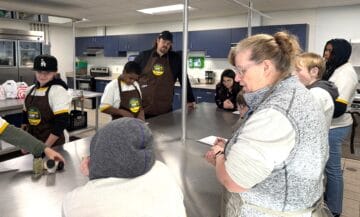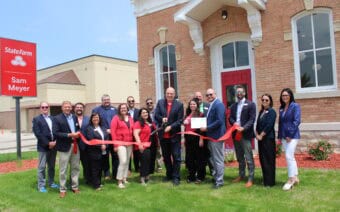
November 18, 2024
NORTHEAST WISCONSIN – Since Robert Thiel founded Family Insurance Center (FIC) in 1988, the world has changed, and so has FIC.
However, the foundation on which the business was built, Eric DeBruin, partner at FIC, said remains focused on personalized, knowledgeable service for the communities it serves.
The number of locations has grown since FIC’s founding and has accelerated significantly since DeBruin, Chad Van Camp and Darren Van Camp took over the business in 2005.
Today, DeBruin said FIC has 10 locations staffed by 54 employees throughout Northeast Wisconsin and beyond – with each office serving as a multi-line personal, commercial, property/casualty agency that caters to each community’s people, businesses and farms.
FIC has offices in Stockbridge, Freedom, Chilton, Green Bay, Menasha, Antigo, Oconto Falls, Hortonville, Schofield and Seymour.
DeBruin said the company acquired agencies in several of those locations to bring them into the FIC fold.
Though when acquired a few were heavily concentrated on personal lines of insurance, DeBruin said FIC intentionally diversified them to 30% commercial insurance, 30% farm insurance, 30% personal insurance and 10% a mix of insurances – a balance Thiel introduced at the company’s inception.
DeBruin said this is a direct reflection of the communities they serve: businesses, farms and people.
“That is the making of a healthy agency,” he said. “We have to represent the community properly. We have great businesses, great small farmers and great people, and our agency has brought on (other) agencies that didn’t have that quality mix.”
Intentional growth
DeBruin said that isn’t the only growth happening with FIC.
Among the agency’s latest developments, he said, is an evolving partnership with Community First Credit Union (CFCU) – including a new, joint location in Seymour – and a move to a remodeled location in Hortonville.
DeBruin said these opportunities are direct outgrowths of the communities’ growth.
FIC’s relationship with CFCU, DeBruin said, began two years ago when the credit union divested itself of its personal lines insurance business.
FIC, he said, stepped in to provide insurance for CFCU’s members.
Since then, DeBruin said there’s been a “natural progression” for the credit union to partner with FIC in a new way – teaming up to create a shared location in downtown Seymour.
It’s a development that DeBruin said he anticipates will help to jump-start Seymour’s downtown.
“There was an old Chase Bank building for sale for multiple years that we decided to buy,” he said. “I knew the community had never had a credit union and thought it needed something like that, so we asked CFCU if they wanted to share a location, and they said ‘yes.’”
Construction on that building, DeBruin said, is underway with FIC planning to move from its current Seymour location to that downtown building in the spring.
“It’s a great place to do business, in a city inking a deal with Lexington on a home development behind Soda Sense,” he said. “I feel like Seymour has been overlooked, and I am confident we are going to do great things there.”
In a similar vein, DeBruin said FIC chose to move its Greenville location it acquired to Hortonville in an office just one block from a local school.
The company acquired the location in 2023 and wrapped up the remodel with a grand opening earlier this year.
The decision to grow in Seymour and Hortonville alike, DeBruin said, is a data-driven one, rooted in population growth, population demographics and other factors.

“These communities are ripe for this,” he said. “They have all the things we talk about – quality businesses and quality school districts – that typify great families, and we insure great families.”
DeBruin said FIC is proud to support entire communities as well.
Giving back, he said, is a tightly-held mantra at FIC, especially with community organizations that resonate with employees’ volunteer interests.
“If you’re involved in it, we’re doing it,” he said. “We align with what’s important to our people, whether it’s culturally, through tithing, etc.”
And though those core elements of doing business remain constant, DeBruin said he closely monitors trends and other variables affecting their customers and the industry.
When it comes to trends, he said FIC is the type of company to sit back, observe and assess before making any decisions.
“We listen and watch and are astute,” he said. “If a whole bunch of things are happening in a specific direction, we are simply mindful and don’t just jump off the bridge just because everyone else is.”
DeBruin said experience has shown him that with the right observation and assessment, it is often more successful to forgo the common path and pave their own.
For example, when COVID-19 struck, he said the firm followed the Stay in Place order as required at the beginning of the pandemic.
But by the summer, even the constituency of employees who remained as remote workers headed back to FIC’s offices.
“By June or July, everybody who was remote was back in the offices because they missed each other,” he said.
It was during that time that DeBruin said he established a virtual, all-agency meeting every Thursday at 9 a.m.
He maintains that weekly touch-base long after COVID, as he said it’s a great means for ensuring employees are informed and culture is highlighted with intention.
“To bring that number of people together makes for an expensive half hour, but it’s valuable and enjoyable,” he said. “It’s been great for (gauging) people’s reactions to things.”
For example, at a recent Thursday meeting after the presidential elections, DeBruin said he fanned out the 162 pieces of campaign literature he had received during the election – which he said was meant to illustrate how the ads and associated messages on election pieces aren’t altogether different from the blitz of messaging consumers receive regarding insurance.
Counteracting these messages, he said, are among the greatest challenges of working in insurance today.
DeBruin said the first focuses on encouraging consumers to name and nail down the lowest-cost insurance coverage, while the second inundates consumers to pursue litigation if a policy doesn’t deliver.
“We are truly insuring the most valuable stuff in people’s lives, and yet consumers are inundated with advertising to get the lowest price on the market at all costs,” he said. “We cannot commoditize it – and yet the ‘name your price’ ads are commoditizing on protecting our most prized assets.
DeBruin said there is also advertising from attorneys pushing litigation.
Though it’s all “hard to manage,” he said FIC surges on, working to provide the best service at the most reasonable price.
He said he credits the relationship-based focus of the business with its ability to help understand how to find true value from their insurance and how to rise above a commoditization mindset.
“People buy from people – you see it all the time,” he said. “The people and relationships have not changed, thankfully.”
Other changes
Another item that has changed since FIC opened, DeBruin said, is the inner workings of insurance.
Insurance offices, he said, are doing more of the work in their offices nowadays than insurance carriers have shifted their way, and there’s a simultaneous move to electronic delivery of policies, insurance cards, etc.
And though the convenience of accessing an account online is evident – and FIC supports that convenience – DeBruin said remaining available to print items for customers and to welcome them in the office for their premium payments are continued options at FIC.
That’s at the core of who FIC is, he said.
Tools, such as social media, apps, the website, etc., DeBruin said, are just that: tools.
“Though we use these tools to supplement the relationship, our goal is to also get in front of the person face to face at least once a year,” he said. “That’s too valuable and important not to do. Agencies often find ways to stop people from coming into the office, but we think that’s a great time to (connect), even for five minutes. So much of that is lost in society.”
DeBruin said he and the entire FIC team are looking forward to opportunities materializing in 2025 and hold hope the economy stabilizes.
“Being in the relationship business, especially in a hard time, shows who you really are,” he said. “We’re fortunate to be consistent and steady even through (hard times). We have great carriers, contracts, colleagues and costumes, and we look forward to continuing to serve and be present in our communities.”
 From the football field to the kitchen
From the football field to the kitchen Connecting newcomers to the community, one link at a time
Connecting newcomers to the community, one link at a time







